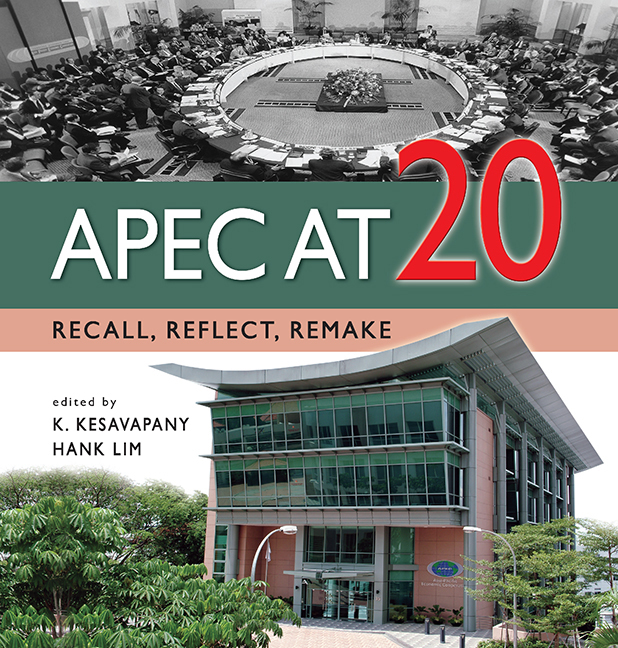Preface
Published online by Cambridge University Press: 21 October 2015
Summary
This year marks the 20th anniversary of the inaugural Ministerial-level meeting held in Canberra in November 1989, which officially launched Asia-Pacific Economic Cooperation (APEC). Publishing a commemorative book on APEC's first 20 years thus seems opportune. In particular, a significant contribution to the existing extensive literature on APEC would be a collection of essays by “old hands” on APEC. Hence, the chosen title for this commemorative book. “APEC at 20: Recall, Reflect, Remake” contains personal and candid recollections and reflections of academics and policy analysts who have a longstanding involvement in APEC on the background of APEC, how its agenda have evolved in the last twenty years, its successes and challenges, as well as their prognoses on its the future, including the need to remake APEC.
Andrew Elek covers the birth of APEC, its overall goals, objectives and guiding principles, the major milestones since its inception, the challenges it faces and its prospects. He rightly points out that the foundations for APEC were laid long before its official launch twenty years ago. He notes both its achievements and disappointments. And he argues that APEC's 20th anniversary can be an opportunity to recover credibility, as well as a time to reaffirm the concept of open regionalism.
Peter Drysdale likewise notes that the first step in considering how APEC might move forward in the future is to recall APEC's origins and the processes on which it is built. In particular, APEC's governing principle of open regionalism entailed a great deal of innovative thinking to come up with a new form of regionalism that would fit the circumstances of the Asia Pacific. Twenty years later, we see the emergence of the new regionalism in East Asia, and growing bilateralism and a move towards sub-regional FTAs that run counter to the principles upon which APEC was designed. A crucial issue for East Asia's global agenda then is to define a relationship between East Asian cooperation and integration that is complementary to trans-regional cooperation in Asia and the Pacific. But APEC's preeminence in the Asia Pacific region persists despite the complementary evolution of East Asian regionalism.
- Type
- Chapter
- Information
- APEC at 20Recall, Reflect, Remake, pp. xi - xivPublisher: ISEAS–Yusof Ishak InstitutePrint publication year: 2009

